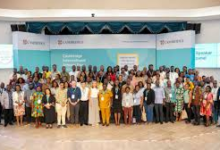Workshop on ratification of 2012 Cape Town Agreement begins in Accra

A regional workshop on the implementation and ratification of the 2012 Cape Town Agreement (CTA) to promote safety in the fishing industry is underway in Accra.
The agreement which has been adopted by the International Maritime Organisation (IMO) outlines regulations designed to protect the safety of crews, and observers.
It is also to provide a level playing field for the industry while setting standards for fishing vessels of 24 metres length and over.
The agreement also requires that all vessels entering a port of a country that is a party to the accord would be subjected to the same inspection standards even if their flag state had not ratified or acceded to it.
Currently, 11 countries including two from Africa, Congo and South Africa, have ratified the agreement with 1,413 vessels out of the required 3,600.
Opening the event yesterday, Minister of Transport, Kwaku Ofori Asiamah, said that, due to lack of proper regulations on the safety of people working in the fishery industry, about 24,000 deaths were recorded annually worldwide.
Additionally, he stated that fishing vessels and their crew had been exposed to exploitation by owners and operators with most of their illicit activities undetected and unpunished, due to the absence of proper regulations.
The sustainability of the fishing industry in Ghana, which provided employment to about 10,000 people and the largest producer of Tuna in Africa and fourth largest globally, he said, was under threat.
“About 125 fishing vessels with length of 24 metres on Ghana’s register are not properly managed due to lack of requisite regulations. It is imperative that the regulations and rules are put in place to streamline and promote safe operations in the fishing sector,” Mr Asiamah noted.
However, he stated that despite various efforts to encourage countries to ratify the agreement, it was yet to meet the entry force requirements.
As a country known for its excellence and adherence to international standards and best practices, Mr Asiamah reiterated the government’s commitment to support the enactment of effective regulations for the fishing industry and urged the Ghana Maritime Authority (GMA) to set the process in motion for the ratification of the agreement.
Thomas Alonsi, Director General of GMA, said the seminar, which was attended by representatives from countries including Nigeria, Sierra Leone, Gambia, Liberia, and Senegal was to encourage member states in the region to ratify the convention to enhance safety of fishing vessels.
It would also equip participants with the knowledge to convince stakeholders in the various member states to consider the significance of the CTA and the positive implications of its ratification, he said.
Head of Marine Technology and Gold-based Standards of the Maritime Safety Division and IMO Representative, Sandra Rita Allnut said despite the development of technology, the maritime industry lacked an effective safety regulation.
“The maritime industry does not have an acceptable safety regulation and therefore had a negative impact on the safety of fishing,” she said.
She urged participating countries to engage relevant authorities to complete the process of ratifying the agreement which was aimed at tackling safety concerns at sea.
BY CLAUDE NYARKO ADAMS and DEBORAH ASUMA





